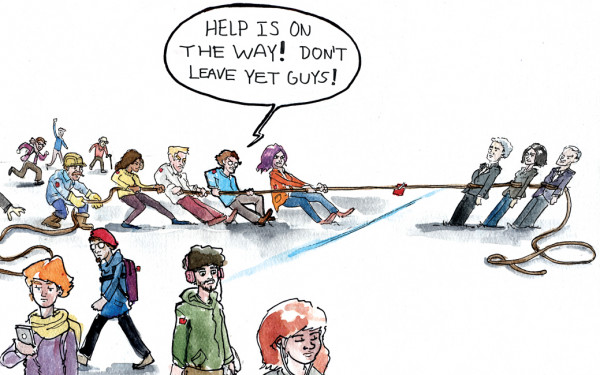Freedom and Liberation: Political Prisoners at Forefront of Palestinian Liberation
Protesters Gather in Front of French Consulate in Support of Georges Abdallah
“Justice is our demand, no peace on stolen land!” The chants echoed across the city as protesters in kuffiyat handed out flyers commemorating Georges Abdallah’s 39th year of imprisonment.
On Oct. 22, the Palestinian Youth Movement organized a protest in front of the French consulate of Montreal in solidarity with Lebanese political prisoner Georges Abdallah.
“This fight is transnational,” said protester Niveen Abu Elulla. “He’s a Lebanese [man] who fought for the Palestinian cause his whole life.”
Now 70, Abdallah is the oldest political prisoner in Europe. He was first imprisoned in 1984 in France for the murder of American and Israeli diplomats and has been eligible for parole since 1999. After nine denied parole requests, the PYM wanted to show solidarity and prove his case still matters.
“We cannot really expect much from France, it’s already a very imperialist colonialist country—and same with the U.S.,”continued Abu Elulla. “Georges Abdallah would have not been in prison if those two powerheads didn’t intervene in the region, so it’s hard to ask them for justice because they don’t understand what justice means.”
Abdallah’s imprisonment is a symbol, according to the PYM, of the strength and determination of the Palestinian intifada. To them, his prolonged imprisonment is proof of the power the resistance holds, of how Zionist governments feel threatened by the potential ofpeople like Abdallah.
“A Lebanese citizen has been imprisoned in a foreign country for too long; his country should be advocating for his rights and demanding his release.” — Bassam
In a series of speeches, Palestinian youth involved in the movement insisted on the importance of remembering people like Abdallah. According to them, there is no liberation of Palestine without the liberation of its prisoners.
“Today is meant to put attention on our prisoners who often get forgotten in our movement,” expressed organizer Elias.
Another protester, who wished to remain anonymous, shared Abu Elulla’s view on transnationalism. As a Lebanese person, they take this fight very personally and are convinced it is everyone’s responsibility to carry Abdallah’s legacy.
For Bassam, a Palestinian passerby who decided to join, the length of Abdallah’s captivity is a multifaceted issue. “The fact that he is still imprisoned is a result of both Israeli-American involvement and a failure of the Lebanese government,” he stated in Arabic. “A Lebanese citizen has been imprisoned in a foreign country for too long; his country should be advocating for his rights and demanding his release.”
_900_563_90.jpg)
However, Abu Elulla also brought up the difficulty of reaching out to a larger audience on social media, and how protests like this one are more sentimental than anything else.
“People who are already interested in the cause are already following the pages and amplifying the voices but I’m not sure if it has a wider reach than that,” Abu Elulla said. “I mean, we’re protesting on Saturday, the embassy is even closed so there is a very limited way we can help out.”
Elias concurred, mentioning the ambiguous guidelines and censorship many social media platforms apply when faced with Palestinian content creators raising awareness.
“It just shows a lot of their own contradictions and double standards that they put on Palestinians,” Elias added. “We need to be able to claim our own narrative, and so we will do that with or without the media giants.”
Despite the heaviness of the issue at hand, the protesters danced to folk music. This goes to show that the Palestinian spirit will not be crushed, Bassam believes. “Seeing young Palestinians fighting for their country like that is truly touching,” Bassam said. “I believe freedom is near, and it’s not just an emotional patriotic belief.”

_900_563_90.jpg)
_600_832_s.png)

2_600_375_90_s_c1.jpg)

05_600_375_90_s_c1.jpg)
